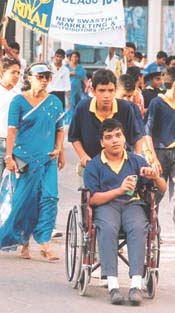
31st October 1999
News/Comment|
Editorial/Opinion| Plus|
Business| Sports| Sports
Plus|
Mirror Magazine

![]()

ROYAL MARCH TO MILLENNIUM :
Thy spirit first to life awoke: in true Royal spirit, the
young and old students, their parents and well-wishers
of Royal College particiapted in their thousands
yesterday at the Royal Millennium March.
Pic by M. A. Pushpakumara








Thondaman dead, State funeral likely
By Faraza Farook
 Minister
and Ceylon Workers Congress leader Saumyamoorthy Thondaman — who was expected
to play a crucial role in the re-election of President Chandrika Kumaratunga
— suffered a heart attack and died suddenly yesterday, leaving the country
and the plantations especially in shock and uncertainty.
Minister
and Ceylon Workers Congress leader Saumyamoorthy Thondaman — who was expected
to play a crucial role in the re-election of President Chandrika Kumaratunga
— suffered a heart attack and died suddenly yesterday, leaving the country
and the plantations especially in shock and uncertainty.
The 87-year-old Mr. Thondaman who won citizenship for nearly 500,000 plantations workers of Indian origin and was admired or scorned as a kingmaker in national politics in recent elections, was taken ill suddenly and rushed to the Nuwara Eliya Hospital yesterday morning after he suffered a heart attack. He was later flown by helicopter to Sri Jayewardenapura Hospital where he was taken straight to the intensive care unit and given a heart massage while specialists battled to save his life.
He was given artificial respiration but the champion of the plantation workers and shrewd strategist gave up his final battle and passed away at 7. 30 p.m.
Family members in those last desperate hours were trying to make arrangements to fly him to Chennai, but specialists at Jayewardenapura advised it would not be prudent to move him.
As the news of his serious illness and then his death came and spread, television and radio stations interrupted their programmes to announce the news which marked the end of an era and the end of the road for an estate kangani's son who rose to be a powerful trade union and later political leader.
The Sunday Times learns that the government is expected to honour the late leader with a state funeral unless the family members want a private funeral. Mr. Thondaman was an MP on the UNP national list and his vacancy will be filled by the UNP. Ministers S. B. Dissnayake and A. H. M. Fowzie and UNP frontliner Anura Bandaranaike came to the Jayewardenapura hospital last night soon after they learnt about the death.
Born on July 8, 1913, Mr. Thondaman built the Ceylon Workers Congress into the most powerful trade union with a fiercely loyal membership of some half a million. Entering parliament in 1947, he was initially overshadowed by northern Tamil leaders such as S. J. V. Chelvanayakam and G. G. Ponnambalam.
In 1972 when the Tamil United Front was formed in the wake of the Republican constitution that year, Mr. Thondaman was elected as a co-president along with Mr. Chelvanayakam and Mr. Ponnambalam, but later kept away when the movement turned to violent agitation.
Since 1977, he has been a cabinet minister in the successive administrations of Presidents J. R. Jayewardene, R. Premadasa, D. B. Wijetunga and Chandrika Kumaratunga. No other minister in Sri Lanka's history had served uninterrupted in the Cabinet for 22 years.
A personal friend and admirer of President Jayewardene, he did not mind launching strikes while being a cabinet minister. He was also credited with having saved the Premadasa presidency after the impeachment motion.
Since 1994, Mr. Thondaman played a strange role of being nominated on the opposition list but serving in the cabinet. However, his influence over the past few years has declined with the CWC suffering setbacks in estate areas at the recent provincial and local council elections.
In one of his last interviews given to The Sunday Times, Mr. Thondaman said he and the CWC would throw their full support behind President Kumaratunga in the current presidential election campaign.
As an ordinary agriculture worker, Mr. Thondaman first contested Nuwara Eliya seat on the ticket of the Ceylon/Indian National Congress which later became the Ceylon Workers Congress and Mr. Thondaman its leader. Since 1960, he switched camps from the SLFP to the UNP several times and often played a key role in making or unmaking governments.
In the sensational 1964 no-confidence motion against the Sirima Bandaranaike government, Mr. Thondaman was absent when the government lost by one vote.
In 1965, he backed the UNP. Then in the 1970s, the SLFP and then firmly with President J. R. Jayewardene from 1977.
During the next 17 years under Mr. Jayewardene and Mr. Premadasa, he achieved much for the estate people, including full citizenship and other benefits.
CBK-pensioners in crucial talks
By Shelani de Silva
With hundreds of thousands of pensioners threatening to spoil their votes at the presidential election in December, President Kumaratunga is moving urgently to settle their grievances and has called a meeting with the main pensioners' union on Friday.
Pensioners' Union Secretary Mervyn Perera told The Sunday Times they would be putting forward five demands, including the standardisation of pensions and implementation of a recommendation that they be given a 30 percent increase instead of the 10 percent they were getting now.
He said they had waited more than five years for these demands to be fulfilled and they would not wait any longer but would call on their members and their families — meaning more than one million voters to spoil their votes if the grievances were not settled.
The pensioners who have held several demonstrations in Colombo and elsewhere say they threw their weight behind the PA in 1994 but they would now be forced to withdraw their support if the promises were not fulfilled.
The Govt. recently appointed a committee headed by Minister D. M. Jayaratne to look into the grievances of pensioners and July strikers.
Meanwhile the July strikers who also were hundred percent behind the PA in 1994, are also sending signals that they would back an alternative candidate because they were disappointed with the government's attitude.
Moneybags tossed both ways
By our Political Editor
 December's
presidential election has set off a flurry of activity amongst the country's
business elite, both in urbane Colombo and the rural areas.
December's
presidential election has set off a flurry of activity amongst the country's
business elite, both in urbane Colombo and the rural areas.
Investment, insurance, or simply bribery, call it what you like, rupees are finding their way into party coffers, The Sunday Times learns. Quite often, the wise businessman hedges his bets by backing all sides.
While lesser known candidates with small vote bases are struggling with their 'resources', euphemism for 'cash', the big names president Chandrika Bandaranaike Kumaratunga and Ranil Wickremesinghe are at a distinct advantage. The magnates stumbling over each other to make 'contributions'.
This week a well known arms dealer, who has access to the SLFP's general leadership met the UNP's wannabes among whom are recently appointed electoral organizers from the mercantile sector to dole out the dough he had made under the PA's military strategies which have been highly criticized by the UNP.
The arms dealer, who has now diversified into other areas such as power projects was once known to have claimed that he has many friends in high placesfrom all parties. "In fact," he had said "I have the best money can buy."
Others are no better or worse. And no political leader has had the guts to refuse the cash from whoever it comes. That is why heroin dealers and kassippu mudalalis back local MPs, and the country remains in the grip of crime.
At least two major financiers of the PA in 1994, people who operate like maharajas, and the man in the arrack distillery trade who has shares in several other businesses are now backers of the UNP.
The reason being the shunning by President Kumaratunga of the people who gave her a brand new Mercedes for her campaign in 1994. The other businessman is angry because the President sacked him from a high flying chairmanship and despite trying, couldn't prevent the Customs bringing him to courts on charges of smuggling sausages.
However, this businessman, like the people with access, is also extremely close to the SLFP's general leadership and maintains a healthy if not wealthy relationship. MPs from all sides in the Gampaha district are all his friends, and despite UNP's General Secretary making a blistering attack on him in Parliament, the UNP was unable to do much else.
Contd. from pg. 1
The reverse is true as well. One top flight holding which made it good during the UNP era (except the Premadasa period) has now become the blue eyed boys of the PA specially after a recent deal in the Port.
The top executives are advising the PA leadership, while the lesser directors in the same board are advising the UNP leadership placed in quay (sic) posts in the parties communications department. A wag was to remark 'The holdings' first eleven is with the PA, the second eleven with the UNP'.
A company in the metropolitan area is also in the big league of funding all sides. It has offered financial support to the UNP while engaged in 'development projects' in the Matara district to help the PA. Whether the company finds it necessary now to finance the United Left Front as well is yet to be seen.
Individuals in the periphery of the big league play the same game. For instance, one businessman who is a major financier of the Muslim Congress helps the UNP through a city mayor. Two brothers in the commercial field backed either side respectively.
Seasoned campaigners estimate presidential campaign to cost in the region of Rs.200 million if not more. Bulk of the expenses incurred are for transport (vehicles and fuel), stages, posters, (at least a million are required to be effective), communications and for 'volunteers'.
Both the PA and UNP have gone in for hi-tech and high pressure campaigning this time. The latest information technology is being used, mainly to reach voters in the North and the East.
Satellite equipment with wide screens is being used by both candidates to reach audiences of 300,000 within three hours in remote areas.
The expenses are much higher when in the opposition because an incumbent government can rely on the tax payers' money to bankroll its activities. For instance, a trip from Colombo to Badulla be in a state vehicle with petrol and the drivers including their overtime paid by the state.
A campaigner with the PA said their election's budget came close to Rs. 300 million. The PA has earmarked millions for the government's Information department. The director of information denied these monies are for political propaganda and pointed out that the monies would not be available at the time of elections.
Critics claimed that these monies were for next year's parliamentary elections. In any event governments pay their bills after a considerable period.
Political observers have called foe a UK style state funding of parties, right through the year, ( not just at election time) so that parties can pay for researchers and others, and nor rely on business magnates and others who encash these I.O.U.s later at the expense of the nation.
But these observers were skeptical if it would work in Sri Lanka. The fact that Sri Lankan parties given their proven track record, will take the monies from the state — and the business magnates as well.
![]()
Front Page| News/Comment| Editorial/Opinion| Plus| Business| Sports| Sports Plus| Mirror Magazine
Please send your comments and suggestions on this web site to

